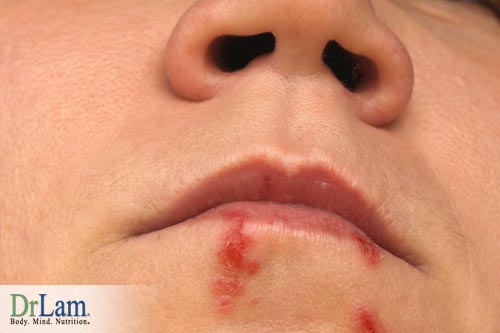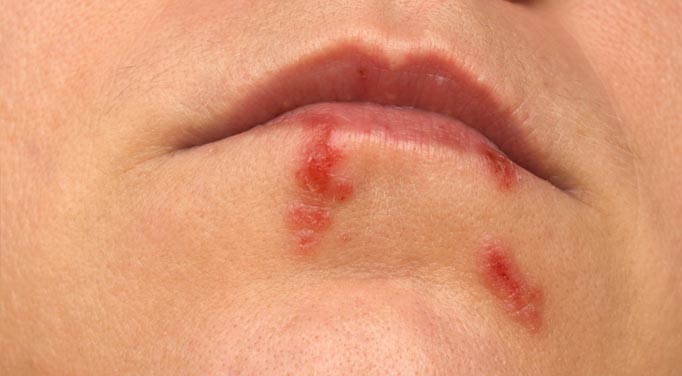 In a study conducted at Umeå University in Sweden, researchers determined that individuals with herpes simplex virus 1 (HSV-1), the virus that causes most cold sores, were at almost double the risk of developing Alzheimer's Disease. Once infected with the virus, it stays in the body forever, though it is only active periodically. About 90% of Americans have had at least one cold sore in their lifetime, while 40% of American adults suffer from recurrent cold sores.
In a study conducted at Umeå University in Sweden, researchers determined that individuals with herpes simplex virus 1 (HSV-1), the virus that causes most cold sores, were at almost double the risk of developing Alzheimer's Disease. Once infected with the virus, it stays in the body forever, though it is only active periodically. About 90% of Americans have had at least one cold sore in their lifetime, while 40% of American adults suffer from recurrent cold sores.
One study examined samples from 360 Alzheimer's patients provided an average of 9.6 years before the patient was diagnosed. These samples were compared with a similar number of samples from patients who had no symptoms of dementia. This study confirmed the findings of a number of earlier, smaller studies that suggested a significant increase in Alzheimer's disease for those who carried the virus.
A second, larger study followed 3, 432 volunteers whom the researchers followed for an average of 11.3 years. This study also found that those participants with the herpes simplex 1 virus were nearly twice as likely to have developed Alzheimer's disease as those who had not.
Researchers are unclear as to the actual correlation between the virus and Alzheimer's disease. One theory is that the virus weakens the immune system, making individuals more susceptible. Another theory suggests that it is the antibodies to the virus, or perhaps changes to the immune system, rather than the virus itself, that may be actually increase the risk. Another theory suggests that an elderly person's weakened immune system may make them mure vulnerable to the virus invading and affecting the brain.
A study from 2011 could shed some light on the correlation. In that study, researchers found that reactivating dormant viruses caused them to interact with cell membranes that contained amyloid precursor proteins. These proteins are the chemicals directly responsible for the development of Alzheimer's disease. Those researchers noticed that the interactions between the viruses and the proteins allowed the herpes simplex 1 virus to travel along the nerves. They also noticed that the transportation and distribution of the proteins was disrupted. The researchers believe this could stimulate the production of amyloid plaques, a biomarker of Alzheimer's disease.
What is known is that a number of chronic neurological conditions have been associated with persistent viral infection. In addition, herpes encephalitis causes symptoms in the hippocampus and temporal lobes. Research has shown that these areas of the brain are among the first affected in early stages of Alzheimer's disease.
A major issue with the study involves the diagnosis of Alzheimer's. The diagnoses were based on clinical symptoms, a method of diagnosis that is only about 70% accurate. A more accurate diagnosis, using amyloid PET scans or testing cerebrospinal fluid, would further confirm whether the incidence of Alzheimer's increases, or simply the incidence of Alzheimer's-like dementia symptoms.
More research is needed, but the researchers are hopeful that treating herpes infections with antiviral medications could offer hope for reducing the risk of Alzheimer's disease.
A herpes simplex virus 1 outbreak is usually associated with stress of either a psychological of physiological nature, for example, sunburn, illness, or an incident that causes your stress levels to shoot up. Stress, of any kind, however, has the result of an increase in the production of cortisol in the adrenal glands. Higher cortisol production has an effect on the body in that it suppresses immunity and other functions in the body that are considered non-essential for life support.
A constant increase in cortisol production, however, causes the adrenal glands to become overworked. Finally, once they are no longer able to continue with the constant, increased cortisol production, the adrenals become fatigued, and cortisol production drops. This leads to very low levels of cortisol. Low cortisol levels also cause a decreased immunity. Additionally, the presence of the herpes outbreak itself is a stressor, thereby compounding the problem.
 Strengthening the immune system means getting your cortisol production (or lack thereof) under control. Fortunately, there are a number of things one can do to get it and the accompanying symptoms of Adrenal Fatigue under control. Unfortunately, the problem did not develop overnight, so recovery is a long, ongoing process.
Strengthening the immune system means getting your cortisol production (or lack thereof) under control. Fortunately, there are a number of things one can do to get it and the accompanying symptoms of Adrenal Fatigue under control. Unfortunately, the problem did not develop overnight, so recovery is a long, ongoing process.
Yes, because they are stressful in the body.

